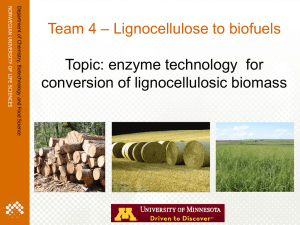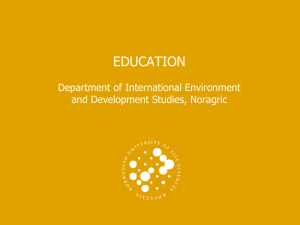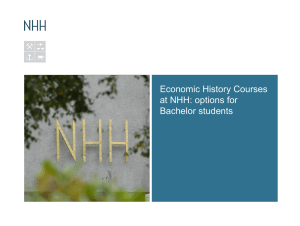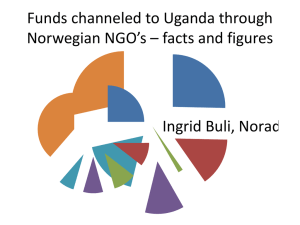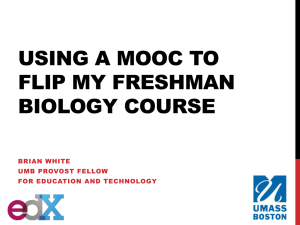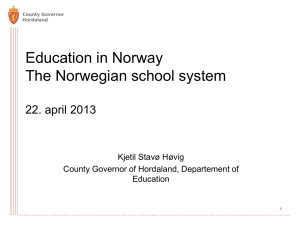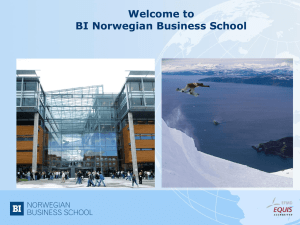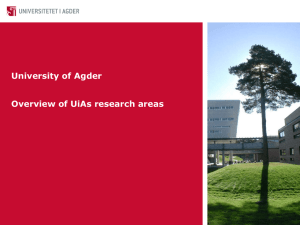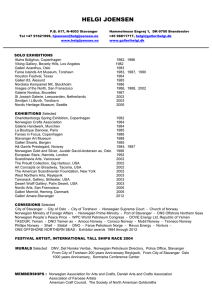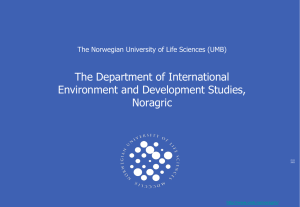The main principle for developing linguistic diversity at UMB is
advertisement
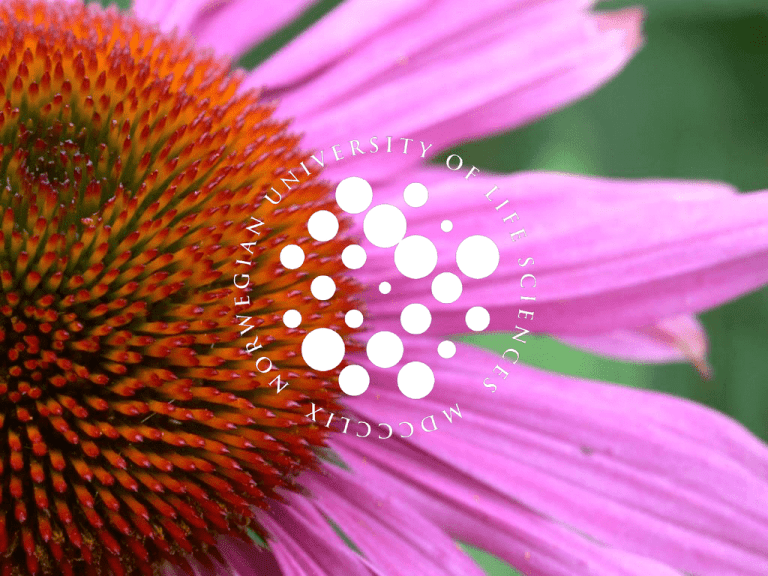
UMB IN A NUTSHELL INSERT TILTLE HERE UMB IN A NUTSHELL NORWEGIAN UNIVERSITY OF LIFE SCIENCES The NORWEGIAN UNIVERSITY OF LIFE SCIENCES • Aims to be a leading international centre of higher education and research within natural sciences, technology, social sciences and related interdisciplinary fields. • Aims to contribute to finding solutions to the challenges of today and tomorrow within agricultural production, environment- and land use management and business development. www.umb.no 3 UMB IN A NUTSHELL NORWEGIAN UNIVERSITY OF LIFE SCIENCES The NORWEGIAN UNIVERSITY OF LIFE SCIENCES • Established in 1859 as the Norwegian agricultural postgraduate college • 3150 students (2008) − 850 Bachelor − 1850 Master − 350 Other • 380 PhD and post-graduate students • 940 staff − of which 495 scientific • Offers 2-, 3- and 5-year academic studies − (Bachelor’s, Master’s and PhD) www.umb.no 4 UMB IN A NUTSHELL NORWEGIAN UNIVERSITY OF LIFE SCIENCES 5 www.umb.no UMB IN A NUTSHELL NORWEGIAN UNIVERSITY OF LIFE SCIENCES DEPARTMENTS • • • • • • • • Animal and Aquacultural Sciences, IHA Chemistry, Biotechnology and Food Science, IKBM Ecology and Natural Resource Management, INA Economics and Resource Management, IØR Landscape Architecture and Spatial Planning, ILP Mathematical Sciences and Technology, IMT Plant and Environmental Sciences, IPM International Environment and Development Studies, Noragric www.umb.no 6 UMB IN A NUTSHELL NORWEGIAN UNIVERSITY OF LIFE SCIENCES CENTRES • • • • • • Centre for Continuing Education, SEVU Aquaculture Protein Centre, APC Animal Production Experimental Centre, SHF Centre for Plant Research in Controlled Climate, SKP Centre for Integrative Genetics, Cigene Norwegian Centre for Bioenergy Research www.umb.no 7 UMB IN A NUTSHELL NORWEGIAN UNIVERSITY OF LIFE SCIENCES STUDYING AT UMB • 17 Bachelor’s and 43 Master’s programmes, of which 12 Master’s and 1 Bachelor’s programme taught in English • 3-year doctoral education (PhD) • Theoretical and applied scientific education with practical experience Additional programmes: • Practical pedagogical education • Continuing education (tailor-made courses) www.umb.no 8 UMB IN A NUTSHELL NORWEGIAN UNIVERSITY OF LIFE SCIENCES STUDY PROGRAMMES • Ecology and Natural Resource • • • • • • • • • • • • • Animal Science Aquaculture Biology Biotechnology Chemistry Geomatics Applied Informatics and Environmental Modeling • Applied Mathematics and Statistics Spatial Planning • • Environment and Natural Resources • Plant Science • Water and Environmental Technology Management Food Science Forest, Environment and Industry Property and Land Law Natural Science Environmental Physics Industrial Economics and Technology Management • Landscape Architecture • Economics and Resource Management • Development Studies • Teacher education in Natural Science www.umb.no 9 UMB IN A NUTSHELL NORWEGIAN UNIVERSITY OF LIFE SCIENCES ENGLISH MASTER’S DEGREE PROGRAMMES • • • • • • • Agroecology • • • • Feed Manufacturing Technology Animal Breeding and Genetics Aquaculture Computational Biology Development and Natural Resource Economics Development Studies Ecology - Specialisation General Ecology - Specialisation Tropical Ecology and Management of Natural Resources International Environmental Studies Plant Science Radioecology www.umb.no 10 UMB IN A NUTSHELL NORWEGIAN UNIVERSITY OF LIFE SCIENCES INTERNATIONAL CAMPUS • Approx. 16% of students are non-Norwegian, 94 nationalities: Europe 33% Africa 30% Asia 24% North America 4% South America 1% Oherrs 8% • 20% of students spend time studying abroad • 38% of topics are offered in English • Collaboration with approx. 93 universities abroad www.umb.no 11 UMB IN A NUTSHELL NORWEGIAN UNIVERSITY OF LIFE SCIENCES TRENDS IN DEVELOPING AN INTERNATIONAL CAMPUS Number of foreign students • • • • • 2008: 514 2007: 395 2006: 377 2004: 264 2002: 236 Courses in English • 2008: 38% • 2005: 32% • 2004: 31% Scientific papers with international co-authorship • 2006: 41 % • 2005: 36 % www.umb.no 12 UMB IN A NUTSHELL NORWEGIAN UNIVERSITY OF LIFE SCIENCES THE INTERNATIONALISATION PROCESS AT UMB • Establisment of a centre for International Environment and Development Studies, Noragric (1986) − English Master programme MNRSA as a ”flag ship” • Teaching in English • International Strategy for the university (2005) • Language Policy for the university (2007) The main principle for developing linguistic diversity at UMB is "parallel lingualism", defined as a form of bilingualism that systematically gives equal status to Norwegian and a/several foreign language/s in academic work. − Language courses offered in French, Norwegian, Spanish, Swahili, Urdu • Institutionalising of networks in institutional agreements www.umb.no 13 NORWEGIAN UNIVERSITY OF LIFE SCIENCES UMB IN A NUTSHELL NATIONALITIES AT UMB (AUTUMN 2007) 14 www.umb.no NORWEGIAN UNIVERSITY OF LIFE SCIENCES UMB IN A NUTSHELL OUTGOING UMB STUDENTS 2005-2007 15 www.umb.no UMB IN A NUTSHELL NORWEGIAN UNIVERSITY OF LIFE SCIENCES UNIQUE SOCIAL ENVIRONMENT • • • • • • • Easy to meet other students Clearly structured student environment All students offered housing in first study year Student Union 70 different associations and clubs University football- and sports field University indoor sports centre and large choice of sports • Ski track • National rowing facility www.umb.no 16 UMB IN A NUTSHELL NORWEGIAN UNIVERSITY OF LIFE SCIENCES THE GROUNDS • UMB is located in scenic surroundings • UMB’s property consists of 600 hectares, of which 10% is covered by the park • The neoclassic park has national cultural-historic value • 1,400 different plant species are found on the grounds • Of special interest: > Magnolia blooms in May > Rhododendron blooms in June www.umb.no 17 UMB IN A NUTSHELL NORWEGIAN UNIVERSITY OF LIFE SCIENCES CAMPUS AAS – A SCIENCE CLUSTER “Campus Aas” consists of UMB and other local institutes: • • • • • Norwegian Food Research Institute (Nofima Mat) • • • • Information Technology services (specialized) (ITAS) Institute of Aquaculture Research (Nofima Marin) Norwegian Forest and Landscape Institute Norwegian Agricultural Economics Research Institute (NILF) Norwegian Institute for Agricultural and Environmental Research (Bioforsk) Norwegian Food Safety Authority (NFSA) Research park at Aas (Bioparken) The University Foundation for Student Life in Aas (SiÅs) www.umb.no 19 UMB IN A NUTSHELL NORWEGIAN UNIVERSITY OF LIFE SCIENCES FINANCIAL FIGURES Total budget (2008): 882 million NOK Of which: • • • • • • 653 million from the Ministry of Education 113 million from the Norwegian Research Council 50 million from the public sector 48 million from the private sector 12 million from other sources, Nordic institutions and the municipal sector 6 million from EU www.umb.no 20 UMB IN A NUTSHELL NORWEGIAN UNIVERSITY OF LIFE SCIENCES ABOUT THIS PRESENTATION About this presentation: Updated 13. 08. 2009 • This presentation is produced by the UMB Communication Department (KA) and is also available in Norwegian. • Updated versions are found http://www.umb.no/about-umb/article/umb-presentationsbrochure-and-study-guide • Send comments and suggestions for improvement to: henrik.mikkelsen@umb.no • Delete this final sheet or adapt it to include relevant contact details for personal presentation purposes. • Slides can be deleted/added by the departments/centres to suit personal presentation purposes! www.umb.no 21
